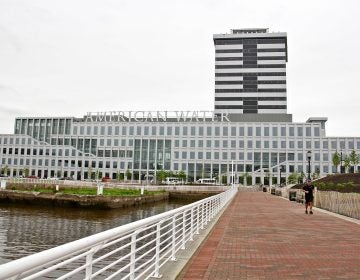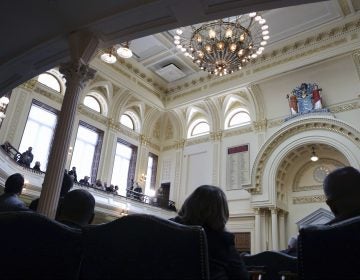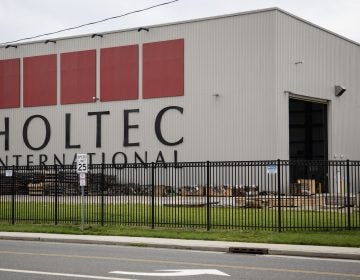Camden rising? As deficit grows, new businesses won’t pay full property taxes for 20 years
Camden’s budget deficit could get worse despite a corporate-office building boom. Many companies won’t pay full property taxes for 20 years.
Listen 4:25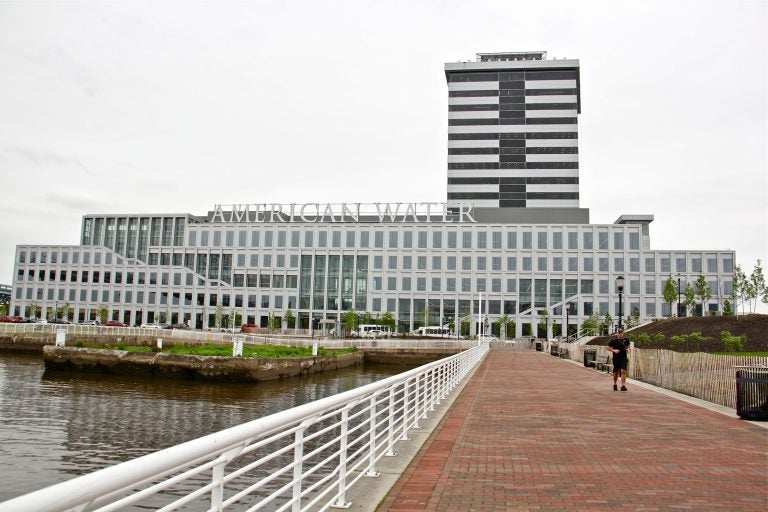
Developments on the Camden waterfront, like the American Water corporate headquarters and the 18-story Camden Tower, receive substantial local tax breaks in addition to state tax incentives. (Emma Lee/WHYY)
Rev. Levi Combs III bristles when elected officials assert “Camden is Rising,” especially when they’re defending the use of lucrative tax breaks to lure corporations to the city.
“Nothing could be further from the truth,” Combs said at a recent gathering of local activists. “Camden is not rising. The budget deficit is rising.”
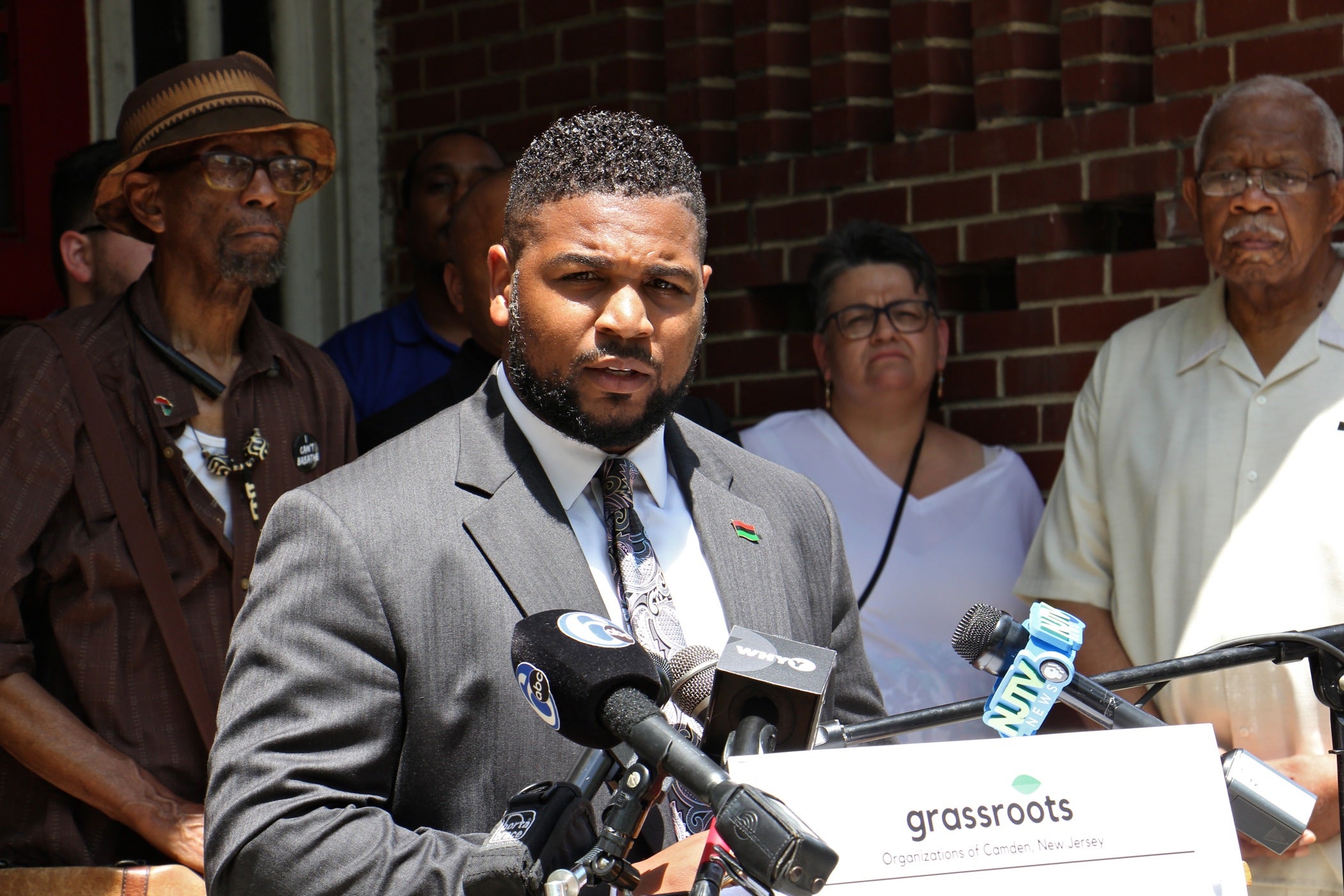
Although Camden of late has seen reduced crime, a record-low unemployment rate and improved educational outcomes, a corporate-office building boom has failed to lift the city’s finances. In fact, Camden is projected to become even more reliant on state aid to stay solvent over the next five years.
How can it be that the opening of dazzling new facilities for the likes of Subaru and the 76ers has failed to translate to a corresponding boost in property taxes — money that’s used to fund schools, pay police and pave roads?
The answer is that in addition to the $1.6 billion in state tax breaks awarded to those companies, Camden also extended them local tax abatements that cut their property taxes roughly 70% over 20 years.
That includes no payments at all on-site “improvements” for the first decade. So, for example, if a company were to build a new headquarters on a vacant field, it could pay taxes for a decade as if the property were still a field.
A real-world example is the trio of companies who received $245 million in state tax breaks to relocate to a new 18-story office tower on the Camden waterfront. Rather than paying the city roughly $91 million over 20 years, the companies — insurance brokerage Conner Strong & Buckelew, logistics company NFI and homebuilder The Michaels Organization — are expected to pay only $25 million.
Dan Fee, a Conner Strong spokesman who responded to questions on behalf of the companies, pointed out that’s $25 million more than what the site was previously generating as a publicly-owned parking lot.
He also referred to an internal state analysis obtained by the Philadelphia Inquirer that said once the tower and other new offices return to the tax rolls, they “may dramatically alter Camden’s future revenue generation prospects.”
But Combs and others said they’re not willing to wait.
“Are we to continue to rely on state funding?” he said. “Because what that is, it’s Camden on welfare. And that’s where we’re at right now.”
An optional local tax break
The specific type of abatement used in Camden was created by the controversial 2013 law that established New Jersey’s most recent tax incentive programs.
Those programs expired at the end of June, but they continue to animate a political confrontation between Gov. Phil Murphy, who wants to reign in the use of tax incentives, and South Jersey Democrats, who say the old system was vital to Camden’s turnaround and resent Murphy’s criticism.
An obscure provision in the law — now N.J.S.A. 52:27D-489s — gave certain municipalities the option to provide additional tax incentives to companies. They would pay no taxes on any improvements for 10 years, and then ramp-up to full taxes in years 11 to 20.
In December 2013, Camden opted in.
The 76ers, awarded $82 million in state tax breaks to build a new training complex, does not pay taxes on a waterfront facility valued at $29 million, according to tax records. The organization pays about $45,000 a year for the 3-acre parcel it occupies.
Subaru, which won nearly $118 million in state tax breaks, similarly does not pay taxes on a new headquarters valued at $48 million. It paid about $77,000 last year for its nearly 13 acres of land, tax records show.
American Water, whose new office building greets visitors who enter New Jersey over the Ben Franklin Bridge, is exempt from taxes on its $49 million facilities, although it pays about $44,000 in property taxes on its 1.8-acre waterfront perch. The state awarded American Water $164 million in tax breaks.
The property tax rate in Camden is about $3 for every $100 of assessed value.
Holtec, the winner of one of the largest tax breaks in state history, faces no property tax liability at all for a new facility valued at more than $150 million. The nuclear services provider was awarded $260 million to relocate to Camden and now occupies tax-exempt land owned by the South Jersey Port Corporation.
A city spokesman said Holtec recently finalized an agreement to make voluntary payments to the city as if it had a tax abatement similar to other companies, but he did not provide a copy of that agreement or say how much the payments are. Holtec did not respond to a request for comment.
An old, worsening problem
Camden’s struggle to fund itself goes back decades.
Between county and state buildings, Rutgers University-Camden, hospitals and other entities, more than half of all property in the city is exempt from paying taxes.
That has made the city heavily reliant on the state to fund its day-to-day operations: Of its $209 million budget last year, $123 million came from state aid.
Even if every new company paid full property taxes immediately, that money would erase only a fraction of the city’s deficit.
But rather than help dig Camden out of that hole, the use of local tax abatements is expected to make Camden even more dependent on the state, at least in the short run. According to the internal state analysis obtained by the Philadelphia Inquirer, the city’s deficit will balloon from $8 million to $52 million over the next five years amid rising costs for services like police protection.
And while local tax deals are hardly unique to Camden — many municipalities, for example, encourage developers to rehab blighted areas by offering payment-in-lieu-of-taxes agreements, or PILOTs, that exempts them from traditional taxes for a set period of time — it’s noteworthy that in Camden they came on top of hefty tax breaks from the state.
Camden officials are adamant that offering the local tax abatements was the right decision.
First, they point out, it was unreasonable to think that a few new companies could fix the city’s profound revenue problems overnight.
Second, although the new companies are not paying taxes on their buildings, they are paying taxes on the land. So the city is already seeing some benefit, and it will see significantly more after a decade.
Third, the companies may not have moved to Camden at all if not for a combination of the state and local tax breaks, and the city would be no better off than it was six years ago.
“Let’s go back to 2013,” Camden County Freeholder Director Lou Cappelli said in a recent interview. “At that time in 2013, who was going to invest in Camden city without incentives? Who was going to risk hundreds of millions of dollars in a city that then was the most dangerous, some parts of the city literally having crime rates higher than third-world nations? Nobody was going to.

“So in order to attract attention from the private sector in Camden city, Camden city exercised its option to make these favorable tax terms available,” he said. “If not for them, we would not have the investment we have in the city.”
John Boyd, a corporate site selection expert based in Princeton, agreed with Cappelli’s argument.
“Clearly there’s an economic cost to these local incentives. This is money that is not going into school districts and police and sewers and all of these infrastructure needs,” he said. “But on the other side of that coin, these are projects that likely would not be in Camden given the competitive, high-stakes nature of site selection.”
Boyd said clients who previously would never have given Camden a second thought now regularly ask him to explore options in the city. In effect, he said, the tax incentives helped create a virtuous cycle where more companies are now willing to take a chance on Camden, bringing with them jobs and other ancillary benefits.
But Colandus “Kelly” Francis, the vice president of the Camden County NAACP and head of the Camden City Taxpayers Association, said the current situation isn’t fair. Using Holtec as an example, he said residents and longtime businesses are now subsidizing the newly-arrived corporations.
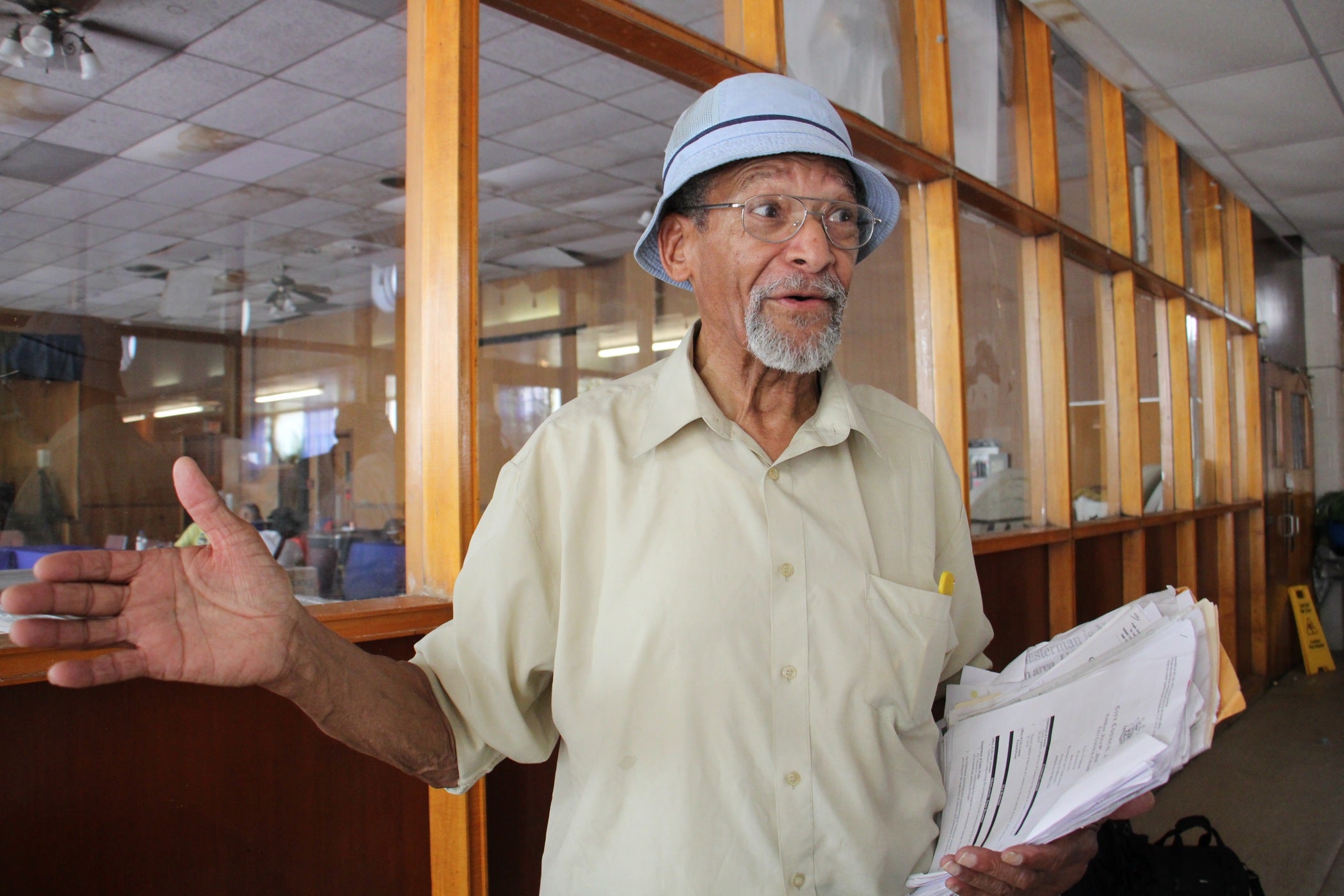
“What we are doing — the homeowners are subsidizing Holtec because we pay for the services that we provide to them,” he said. “Police protection. We pay for fire protection. They use our water and sewer infrastructure. They use our roads, but they pay nothing for the upkeep or maintenance of those services.”
Impact other than taxes
Representatives for several of the new companies were quick to point out the many ways they have supported Camden beyond property taxes.
“American Water coming to Camden is more than just a building, Camden is our home,” said Ruben Rodriguez, a spokesman for the publicly-traded utility. “It’s becoming a part of the community, being a responsible corporate citizen and identifying and participating in different ways to contribute to the city of Camden and continue to strengthen and support the revitalization that the city is currently experiencing.”
Rodriguez said American Water has invested more than $5 million in Camden since 2011, spent more than $13 million with Camden businesses and volunteered thousands of employee hours. It also signed a Community Investment Agreement with the city that details how the company intends to support STEM education, community outreach and workforce development.
Dan Fee, the spokesman for the companies sharing the waterfront tower, said the firms have already paid roughly $5 million to the city in construction fees for the tower and a recently completed apartment complex they own next door. (They pay about $17,000 a year in property taxes for the land the tower’s built on, he said.)
In addition, the firms have created a $1 million grant program for Camden nonprofits and will pay $180,000 into a city workforce development fund, he said. South Jersey powerbroker George Norcross, who is also the executive chairman of Conner Strong & Buckelew, has also raised $250,0000 as the founder of the Camden Health and Athletic Association.
Representatives for the 76ers and Subaru did not respond to requests for comment.
Asked if he had a message for agitated residents, Cappelli, the county freeholder, urged patience.
“After decades of decline, things are getting better,” he said. “It’s not going to change overnight, but certainly all indicators show that things are getting better in Camden and will continue to get better as we progress.”
Combs and other activists, though, say their patience has run out with the city’s leadership.
“This is just a system that, for me and for the residents, is for the rich, and they’re doing it off the backs of the poor,” he said. “We’re fighting against that and we’re not going to stand for it.”
WHYY is your source for fact-based, in-depth journalism and information. As a nonprofit organization, we rely on financial support from readers like you. Please give today.


